 Illegal operators are able to sell at lower prices and undercut genuine operators
Illegal operators are able to sell at lower prices and undercut genuine operators
Firms in the downstream petroleum sector remain livid about the activities of criminals who dump products meant for neighbouring countries back onto the Ghanaian market, saying the only way out is for government to crack the whip.
“Until somebody is arrested and processed and sent to prison, this thing will never ever stop,” William Tawiah of Zen Petroleum said, during an interaction with the Energy Minister, Boakye Agyarko, organised by the National Petroleum Authority.
“We can talk about tracking devices and everything else, the contraband products will still go on because the bottom line is: there is a lot of money to be made in contraband products. Where there is money, people will be willing to take a risk. The only way you can stop it is to jail them…anything less than that, I do not believe anything will change,” William Tawiah said to a loud applause from his industry peers.
A number of other attendees of the forum expressed similar sentiments, after the energy minister had outlined a number of measures government intended to take on the matter, and the general wellbeing of the downstream petroleum sector.
Both Bulk Oil Distribution Companies (BDCs) and Oil Marketing Companies (OMCs) have complained that aside resulting in revenue losses to the state, the smuggling of petroleum products results in huge losses to them.
Chief Executive Officer of the Association of Oil Marketing Companies, Kwaku Agyeman Duah, told the B&FT that the criminal activity resulted in a 15% loss of volumes to his members last year.
The OMCs have been threatening, since April this year, to lay off workers at their filling stations and other offices if the government did not do something about the black market.
The incentive for those who act in the black market lies in the fact that, due to ECOWAS protocols, products meant for Burkina Faso and Mali, mainly, do not attract levies, taxes and margins, which constitute up to 51% of the pump price of products sold locally.
By diverting such products back onto the Ghanaian market, therefore, illegal operators are able to sell at lower prices and undercut genuine operators. Therein lies the problem.
The practice, the Energy Minister admitted, has also created a huge compromise of the Petroleum Products Marking Scheme, which is intended to safeguard the quality of products, since export products are not marked.
“The practice has created an artificial increase in export volumes. Export volumes for Diesel, especially, grew by an astronomical 1829% from just above 10million litres to over 196million litres, while petrol grew by 102%,” Boakye Agyarko said.
“These volumes do not match the volumes recorded by the Malian and Burkinabe regulators as official imports from Ghana, confirming that most of these products do not reach the declared destinations.”
The minister announced a number of measures government is rolling out, through the NPA, to check the criminality, including export and product quality guidelines, review of export licence requests and sanctions for stations that fail the market concentration test.
He also mentioned the ongoing amendment of the Petroleum Products Marking Scheme LI 2187, as well as increased collaboration with National Security and the Police Service as part of the measures.
Also, after meeting on May 9, 2017, government’s Economic Management Team, decided that a number of measures be adopted to curb the dumping of products.
Key among these measures is a new directive that designates the Bolga depot of the Bulk Oil Storage and Transportation Company (BOST) as the sole export depot for the northern sector, and its Accra Plains depot as the sole export depot for the southern sector.
Reacting to the measures government is rolling out, Kwaku Agyeman Duah told the B&FT that: “We said at the end of May [regarding the possible job cuts]. If by the end of May, the volumes are improving, definitely the business person cannot lay the workers off, because he has trained them and he needs them. So, if we see some appreciative volume increase, it helps all of us; government will get revenue, the business will stay and the employees will not be declared redundant.”